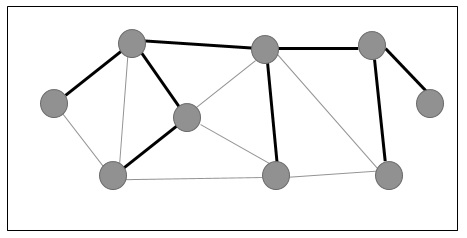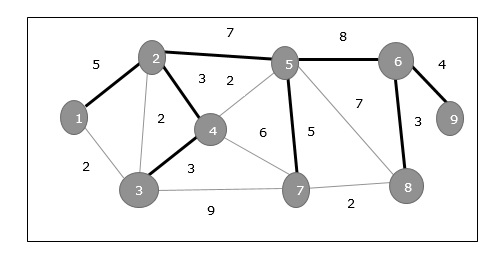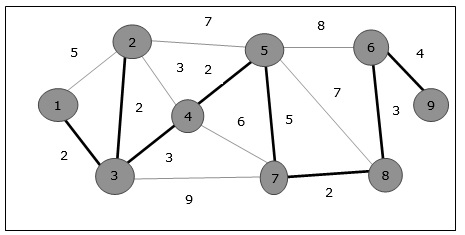
- Design and Analysis of Algorithms
- Home
- Basics of Algorithms
- DAA - Introduction to Algorithms
- DAA - Analysis of Algorithms
- DAA - Methodology of Analysis
- DAA - Asymptotic Notations & Apriori Analysis
- DAA - Time Complexity
- DAA - Master's Theorem
- DAA - Space Complexities
- Divide & Conquer
- DAA - Divide & Conquer Algorithm
- DAA - Max-Min Problem
- DAA - Merge Sort Algorithm
- DAA - Strassen's Matrix Multiplication
- DAA - Karatsuba Algorithm
- DAA - Towers of Hanoi
- Greedy Algorithms
- DAA - Greedy Algorithms
- DAA - Travelling Salesman Problem
- DAA - Prim's Minimal Spanning Tree
- DAA - Kruskal's Minimal Spanning Tree
- DAA - Dijkstra's Shortest Path Algorithm
- DAA - Map Colouring Algorithm
- DAA - Fractional Knapsack
- DAA - Job Sequencing with Deadline
- DAA - Optimal Merge Pattern
- Dynamic Programming
- DAA - Dynamic Programming
- DAA - Matrix Chain Multiplication
- DAA - Floyd Warshall Algorithm
- DAA - 0-1 Knapsack Problem
- DAA - Longest Common Subsequence Algorithm
- DAA - Travelling Salesman Problem using Dynamic Programming
- Randomized Algorithms
- DAA - Randomized Algorithms
- DAA - Randomized Quick Sort Algorithm
- DAA - Karger's Minimum Cut Algorithm
- DAA - Fisher-Yates Shuffle Algorithm
- Approximation Algorithms
- DAA - Approximation Algorithms
- DAA - Vertex Cover Problem
- DAA - Set Cover Problem
- DAA - Travelling Salesperson Approximation Algorithm
- Sorting Techniques
- DAA - Bubble Sort Algorithm
- DAA - Insertion Sort Algorithm
- DAA - Selection Sort Algorithm
- DAA - Shell Sort Algorithm
- DAA - Heap Sort Algorithm
- DAA - Bucket Sort Algorithm
- DAA - Counting Sort Algorithm
- DAA - Radix Sort Algorithm
- DAA - Quick Sort Algorithm
- Searching Techniques
- DAA - Searching Techniques Introduction
- DAA - Linear Search
- DAA - Binary Search
- DAA - Interpolation Search
- DAA - Jump Search
- DAA - Exponential Search
- DAA - Fibonacci Search
- DAA - Sublist Search
- DAA - Hash Table
- Graph Theory
- DAA - Shortest Paths
- DAA - Multistage Graph
- DAA - Optimal Cost Binary Search Trees
- Heap Algorithms
- DAA - Binary Heap
- DAA - Insert Method
- DAA - Heapify Method
- DAA - Extract Method
- Complexity Theory
- DAA - Deterministic vs. Nondeterministic Computations
- DAA - Max Cliques
- DAA - Vertex Cover
- DAA - P and NP Class
- DAA - Cook's Theorem
- DAA - NP Hard & NP-Complete Classes
- DAA - Hill Climbing Algorithm
- DAA Useful Resources
- DAA - Quick Guide
- DAA - Useful Resources
- DAA - Discussion
Design and Analysis - Spanning Tree
A spanning tree is a subset of an undirected Graph that has all the vertices connected by minimum number of edges.
If all the vertices are connected in a graph, then there exists at least one spanning tree. In a graph, there may exist more than one spanning tree.
Properties
A spanning tree does not have any cycle.
Any vertex can be reached from any other vertex.
Example
In the following graph, the highlighted edges form a spanning tree.

Minimum Spanning Tree
A Minimum Spanning Tree (MST) is a subset of edges of a connected weighted undirected graph that connects all the vertices together with the minimum possible total edge weight. To derive an MST, Prim’s algorithm or Kruskal’s algorithm can be used. Hence, we will discuss Prim’s algorithm in this chapter.
As we have discussed, one graph may have more than one spanning tree. If there are n number of vertices, the spanning tree should have 𝒏−𝟏 number of edges. In this context, if each edge of the graph is associated with a weight and there exists more than one spanning tree, we need to find the minimum spanning tree of the graph.
Moreover, if there exist any duplicate weighted edges, the graph may have multiple minimum spanning tree.

In the above graph, we have shown a spanning tree though it’s not the minimum spanning tree. The cost of this spanning tree is (5 + 7 + 3 + 3 + 5 + 8 + 3 + 4) = 38.
We will use Prim’s algorithm to find the minimum spanning tree.
Prim’s Algorithm
Prim’s algorithm is a greedy approach to find the minimum spanning tree. In this algorithm, to form a MST we can start from an arbitrary vertex.
Algorithm: MST-Prim’s (G, w, r)
for each u є G.V
u.key = ∞
u.Π = NIL
r.key = 0
Q = G.V
while Q ≠ф
u = Extract-Min (Q)
for each v є G.adj[u]
if each v є Q and w(u, v) <v.key
v.Π = u
v.key = w(u, v)
The function Extract-Min returns the vertex with minimum edge cost. This function works on min-heap.
Example
Using Prim’s algorithm, we can start from any vertex, let us start from vertex 1.
Vertex 3 is connected to vertex 1 with minimum edge cost, hence edge (1, 2) is added to the spanning tree.
Next, edge (2, 3) is considered as this is the minimum among edges {(1, 2), (2, 3), (3, 4), (3, 7)}.
In the next step, we get edge (3, 4) and (2, 4) with minimum cost. Edge (3, 4) is selected at random.
In a similar way, edges (4, 5), (5, 7), (7, 8), (6, 8) and (6, 9) are selected. As all the vertices are visited, now the algorithm stops.
The cost of the spanning tree is (2 + 2 + 3 + 2 + 5 + 2 + 3 + 4) = 23 . There is no more spanning tree in this graph with cost less than 23.

Example
#include <stdio.h>
#include <stdbool.h>
#include <limits.h>
#define V 9
// Graph represented as an adjacency matrix with weights
int graph[V][V] = {
{0, 5, 7, 3, 0, 0, 0, 0, 0},
{5, 0, 8, 0, 7, 0, 0, 0, 0},
{7, 8, 0, 3, 3, 3, 0, 0, 0},
{3, 0, 3, 0, 0, 5, 0, 0, 0},
{0, 7, 3, 0, 0, 0, 5, 0, 0},
{0, 0, 3, 5, 0, 0, 8, 2, 0},
{0, 0, 0, 0, 5, 8, 0, 3, 4},
{0, 0, 0, 0, 0, 2, 3, 0, 3},
{0, 0, 0, 0, 0, 0, 4, 3, 0}
};
// Helper function to extract the minimum key value from the set of vertices
int extractMin(int key[], bool mstSet[]) {
int min = INT_MAX, min_index;
for (int v = 0; v < V; v++)
if (mstSet[v] == false && key[v] < min)
min = key[v], min_index = v;
return min_index;
}
// Function to find the Minimum Spanning Tree (MST) using Prim's algorithm
void primMST() {
int parent[V];
int key[V];
bool mstSet[V];
// Initialize key values and MST set
for (int i = 0; i < V; i++) {
key[i] = INT_MAX;
mstSet[i] = false;
}
key[0] = 0; // Start with the first vertex (you can start from any vertex)
parent[0] = -1; // First vertex is the root of MST
// Find the MST
for (int count = 0; count < V - 1; count++) {
int u = extractMin(key, mstSet);
mstSet[u] = true;
for (int v = 0; v < V; v++) {
// Update key value and parent index of adjacent vertices
if (graph[u][v] && mstSet[v] == false && graph[u][v] < key[v]) {
parent[v] = u;
key[v] = graph[u][v];
}
}
}
// Print the MST and calculate the total cost
int cost = 0;
printf("Minimum Spanning Tree:\n");
for (int i = 1; i < V; i++) {
printf("Edge: (%d, %d), Weight: %d\n", parent[i], i, graph[i][parent[i]]);
cost += graph[i][parent[i]];
}
printf("The cost of the spanning tree is: %d\n", cost);
}
int main() {
primMST();
return 0;
}
Output
Minimum Spanning Tree: Edge: (0, 1), Weight: 5 Edge: (3, 2), Weight: 3 Edge: (0, 3), Weight: 3 Edge: (2, 4), Weight: 3 Edge: (2, 5), Weight: 3 Edge: (7, 6), Weight: 3 Edge: (5, 7), Weight: 2 Edge: (7, 8), Weight: 3 The cost of the spanning tree is: 25
#include <iostream>
#include <vector>
#include <climits>
using namespace std;
#define V 9
// Graph represented as an adjacency matrix with weights
int graph[V][V] = {
{0, 5, 7, 3, 0, 0, 0, 0, 0},
{5, 0, 8, 0, 7, 0, 0, 0, 0},
{7, 8, 0, 3, 3, 3, 0, 0, 0},
{3, 0, 3, 0, 0, 5, 0, 0, 0},
{0, 7, 3, 0, 0, 0, 5, 0, 0},
{0, 0, 3, 5, 0, 0, 8, 2, 0},
{0, 0, 0, 0, 5, 8, 0, 3, 4},
{0, 0, 0, 0, 0, 2, 3, 0, 3},
{0, 0, 0, 0, 0, 0, 4, 3, 0}
};
// Helper function to extract the minimum key value from the set of vertices
int extractMin(int key[], bool mstSet[]) {
int min = INT_MAX, min_index = -1;
for (int v = 0; v < V; v++) {
if (mstSet[v] == false && key[v] < min) {
min = key[v];
min_index = v;
}
}
return min_index;
}
// Function to find the Minimum Spanning Tree (MST) using Prim's algorithm
void primMST() {
int parent[V];
int key[V];
bool mstSet[V];
// Initialize key values and MST set
for (int i = 0; i < V; i++) {
key[i] = INT_MAX;
mstSet[i] = false;
}
key[0] = 0; // Start with the first vertex (you can start from any vertex)
parent[0] = -1; // First vertex is the root of MST
// Find the MST
for (int count = 0; count < V - 1; count++) {
int u = extractMin(key, mstSet);
mstSet[u] = true;
for (int v = 0; v < V; v++) {
// Update key value and parent index of adjacent vertices
if (graph[u][v] && mstSet[v] == false && graph[u][v] < key[v]) {
parent[v] = u;
key[v] = graph[u][v];
}
}
}
// Print the MST and calculate the total cost
int cost = 0;
cout << "Minimum Spanning Tree:" << endl;
for (int i = 1; i < V; i++) {
cout << "Edge: (" << parent[i] << ", " << i << "), Weight: " << graph[i][parent[i]] << endl;
cost += graph[i][parent[i]];
}
cout << "The cost of the spanning tree is: " << cost << endl;
}
int main() {
primMST();
return 0;
}
Output
Minimum Spanning Tree: Edge: (0, 1), Weight: 5 Edge: (3, 2), Weight: 3 Edge: (0, 3), Weight: 3 Edge: (2, 4), Weight: 3 Edge: (2, 5), Weight: 3 Edge: (7, 6), Weight: 3 Edge: (5, 7), Weight: 2 Edge: (7, 8), Weight: 3 The cost of the spanning tree is: 25
import java.util.Arrays;
class MSTPrimAlgorithm {
private static final int V = 9;
// Graph represented as an adjacency matrix with weights
int graph[][] = {
{0, 5, 7, 3, 0, 0, 0, 0, 0},
{5, 0, 8, 0, 7, 0, 0, 0, 0},
{7, 8, 0, 3, 3, 3, 0, 0, 0},
{3, 0, 3, 0, 0, 5, 0, 0, 0},
{0, 7, 3, 0, 0, 0, 5, 0, 0},
{0, 0, 3, 5, 0, 0, 8, 2, 0},
{0, 0, 0, 0, 5, 8, 0, 3, 4},
{0, 0, 0, 0, 0, 2, 3, 0, 3},
{0, 0, 0, 0, 0, 0, 4, 3, 0}
};
// Helper function to extract the minimum key value from the set of vertices
int extractMin(int key[], boolean mstSet[]) {
int min = Integer.MAX_VALUE, minIndex = -1;
for (int v = 0; v < V; v++) {
if (!mstSet[v] && key[v] < min) {
min = key[v];
minIndex = v;
}
}
return minIndex;
}
// Function to find the Minimum Spanning Tree (MST) using Prim's algorithm
void primMST() {
int parent[] = new int[V];
int key[] = new int[V];
boolean mstSet[] = new boolean[V];
Arrays.fill(key, Integer.MAX_VALUE);
Arrays.fill(mstSet, false);
key[0] = 0; // Start with the first vertex (you can start from any vertex)
parent[0] = -1; // First vertex is the root of MST
// Find the MST
for (int count = 0; count < V - 1; count++) {
int u = extractMin(key, mstSet);
mstSet[u] = true;
for (int v = 0; v < V; v++) {
// Update key value and parent index of adjacent vertices
if (graph[u][v] != 0 && !mstSet[v] && graph[u][v] < key[v]) {
parent[v] = u;
key[v] = graph[u][v];
}
}
}
// Print the MST and calculate the total cost
int cost = 0;
System.out.println("Minimum Spanning Tree:");
for (int i = 1; i < V; i++) {
System.out.println("Edge: (" + parent[i] + ", " + i + "), Weight: " + graph[i][parent[i]]);
cost += graph[i][parent[i]];
}
System.out.println("The cost of the spanning tree is: " + cost);
}
}
public class Main {
public static void main(String[] args) {
MSTPrimAlgorithm mst = new MSTPrimAlgorithm();
mst.primMST();
}
}
Output
Minimum Spanning Tree: Edge: (0, 1), Weight: 5 Edge: (3, 2), Weight: 3 Edge: (0, 3), Weight: 3 Edge: (2, 4), Weight: 3 Edge: (2, 5), Weight: 3 Edge: (7, 6), Weight: 3 Edge: (5, 7), Weight: 2 Edge: (7, 8), Weight: 3 The cost of the spanning tree is: 25
def prim_mst(graph):
vertices = len(graph)
parent = [-1] * vertices
key = [float('inf')] * vertices
mst_set = [False] * vertices
key[0] = 0 # Start with the first vertex (you can start from any vertex)
parent[0] = -1 # First vertex is the root of MST
for _ in range(vertices):
u = extract_min_key(key, mst_set)
mst_set[u] = True
for v in range(vertices):
# Update key value and parent index of adjacent vertices
if graph[u][v] and not mst_set[v] and graph[u][v] < key[v]:
parent[v] = u
key[v] = graph[u][v]
# Print the MST and calculate the total cost
cost = 0
print("Minimum Spanning Tree:")
for i in range(1, vertices):
print(f"Edge: ({parent[i]}, {i}), Weight: {graph[i][parent[i]]}")
cost += graph[i][parent[i]]
print("The cost of the spanning tree is:", cost)
def extract_min_key(key, mst_set):
min_key = float('inf')
min_index = 0
for v in range(len(key)):
if not mst_set[v] and key[v] < min_key:
min_key = key[v]
min_index = v
return min_index
# Graph represented as an adjacency matrix with weights
graph = [
[0, 5, 7, 3, 0, 0, 0, 0, 0],
[5, 0, 8, 0, 7, 0, 0, 0, 0],
[7, 8, 0, 3, 3, 3, 0, 0, 0],
[3, 0, 3, 0, 0, 5, 0, 0, 0],
[0, 7, 3, 0, 0, 0, 5, 0, 0],
[0, 0, 3, 5, 0, 0, 8, 2, 0],
[0, 0, 0, 0, 5, 8, 0, 3, 4],
[0, 0, 0, 0, 0, 2, 3, 0, 3],
[0, 0, 0, 0, 0, 0, 4, 3, 0]
]
prim_mst(graph)
Output
Minimum Spanning Tree: Edge: (0, 1), Weight: 5 Edge: (3, 2), Weight: 3 Edge: (0, 3), Weight: 3 Edge: (2, 4), Weight: 3 Edge: (2, 5), Weight: 3 Edge: (7, 6), Weight: 3 Edge: (5, 7), Weight: 2 Edge: (7, 8), Weight: 3 The cost of the spanning tree is: 25